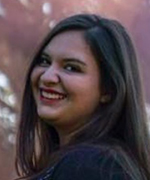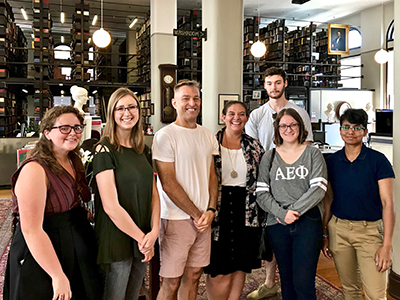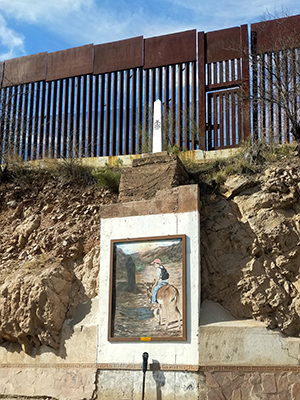
- sophomore double major in Political Science and Critical Race & Ethnic Studies
- studying in the combined BA-MA program for Political Science
- from Cincinnati, OH
- conducting an independent study on immigration policy and xenophobia
- visited the Arizona Desert and the U.S.-Mexico border for 'On the Border' trip (Spring 2018)
"Don't be scared to take risks. If you have a passion for what you're doing, you can make change no matter where you are in your life journey. Don't let your own fear of not being good enough stop you from doing something great."
Why Miami?
"My parents and my sister all went to Miami, which at first made me not want to come here! However, I came for a tour of Miami's graphic design program, which was my initial interest along with international relations. I ultimately chose Miami because of how flexible the university is in its wide range of program offerings and supportive professors.
"I started my first semester slow, taking only two art classes, but then I discovered political science and linguistics and absolutely loved them. I had been starting to realize that not only was I not doing so great in my art classes but also I actually liked academic classes a lot more. I was getting more excited about political science, linguistics, and others, so I decided that maybe art wasn't the right thing for me."
Best Miami Experiences

Selena Mungur (4th from left) and Humanities Summer Research Institute colleagues at the Mercantile Library in Cincinnati
"From the beginning it's been amazing. Every single class I've taken has opened my mind to new things, making me fall in love with learning all over again. In my second semester, I took an immigration social justice class, SJS 350, co-taught by Sara Williams, Miami's associate director of community-engaged learning, and Suzanne Klatt, the director of the Mindfulness and Contemplative Inquiry Center. It was great to ground myself in such an intense topic while in a very open, welcoming space ,and I grew very close with everyone in the class.
"As part of the class, during spring break last year we went to Tucson, Arizona, where we visited the U.S.-Mexico border, sat in on court proceedings, and met with multiple non-profit organizations in order to further understand U.S. immigration policies. It was an immersive experience that really changed what I want to go into, and that's what led me to the new Critical Race and Ethnic Studies (CRES) major.
[See the CAS press release Miami's updated Critical Race & Ethnic Studies major offers students a powerful new cognitive tool to confront today's global challenges.]
"I am also doing a specialized track in my CRES major that is focused on migration studies. This specialization correlates with an independent study I am currently working on studying the effects of religious and racial xenophobias on international immigration policies. I'm working with associate professor of Political Science Erica Edwards, who taught my Comparative Politics class last spring. She has helped me to develop my final paper in her class into my current research project and has been a fantastic mentor throughout my research journey thus far. I'm hoping to continue to grow this project into my thesis for the Combined Bachelor-Masters program in Political Science and then get it published.
"I've also been helping with visiting assistant professor of sociology Michael Loadenthal's Prosecution Project (tPP) this semester. We're looking at American court cases about terrorist acts and then collecting data for each case, how they were treated in the system, and other factors.
"All in all, Miami has shown me exactly what my passion is, and I love having the opportunity to pursue my own research project. It blows me away how supportive the faculty are here, making my experience at Miami way better than I could have imagined!"
Miami and the Liberal Arts

Artwork along the U.S.-Mexico border
"I came from a very diverse high school, so the liberal arts at Miami have enabled me to learn more about racial theory. One of the readings in my SJS 350 class by Gloria Anzaldúa was about how a multiracial person could move between different situations and cultures. Being multiracial myself, I related to that and wanted to learn more about ethnic boundaries and how people navigate them. I'm learning how to take a step back from things and look beneath the surface at how social and political structures affect our world.
"As I explored my Miami course options, the flexibility of the liberal arts allowed me to switch between a bunch of different majors and combine them all. I was also able to take more classes that interested me, such as my course on immigration — which now counts as part of my CRES major. Being able to move between things and figure out exactly what I want to do and not being held back a year because of that has worked out really well.
"In political science, I really like learning about all the different systems underlying our society. We're studying various changes that come about from elections and transitions of power, and I really like seeing how everything evolves to make different institutions in our world work and connect to one another. This interest ultimately led me to pick up my CRES major.
"As I began putting this newer type of thinking into practice, I've realized that my passion is public policy. I want to examine our current policies that relate to race and ethnicity and understand where the divisions come from. Identifying and solving some of these problems will remove more barriers for people and help bring more unity to our nation and our world."
An Emotional Trip to the Arizona Desert and the U.S.-Mexico Border

Jose Antonio memorial along U.S.-Mexico Border
"This past summer I joined my classmates from SJS 350 to Tucson, Arizona to stay with a group called BorderLinks. The purpose of our trip was to observe what is currently happening at the U.S.-Mexico border. It was an amazing experience that was partially inspired by a talk last fall by Jason de León called "Land of Open Graves." That talk and the Arizona trip really shaped my passion for enacting policy changes in response to racial and social injustice. [See the November 2018 CAS press release Anthropologist Jason De León describes the plight of migrants in the "Land of Open Graves" at the U.S.-Mexican border.]
"On the first day, we joined a group called the Samaritans, who works with BorderLinks, on a hike into the Arizona desert to try to experience what it's actually like for many migrants crossing through the desert. We saw various items that people had left behind — a jacket, some water jugs, a broken shoe, a baby food jar. The Samaritans go into the desert a couple times a week and leave food and water at different stations. If they run into migrants, they'll try to provide legal medical aid.
"In addition, when the Samaritans find a body, which they often do, they plant crosses. We were taken to a cross placed for a 26-year-old Guatemalan male, and our guide read a poem in both English and Spanish which they read every time they plant a cross. The poem describes the hopes and dreams that had died along with these people out in this desert, and that they would not be forgotten. It was tremendously powerful.
"Our guide then showed us a map of all the crosses the Samaritans had erected in the desert, all marked with a dot. There were dozens of these dots within a 20-mile radius of our location, but expanding outward there were hundreds, and then thousands. There were more than we could count scattered across the entire desert. I must have cried a billion times on that trip!
"Personally, I cannot hear stories about innocent lives tragically cut short and not try to do something about it. There are many things about our government's policies towards migrants that could be changes for the better, but are instead being neglected or making the situation worse. Our last day with BorderLinks was spent looking at our next steps — what each of us could do to help people who are caught in our immigration system. While others in the group will go on to do fantastic direct advocacy work, I decided that my goal is to work in public policy to improve some of these conditions. I know I'll definitely keep the stories that I've heard and the things I had seen with me forever, which will serve as a strong motivation for me to try and make change."
Advice to Students
"Don't be scared to take risks. Don't think, 'Oh, I need to have a PhD before I can do research or make a difference.' If you have a passion for what you're doing, you can make change no matter where you are in your life journey.
"I've seen my own mindset evolve from what I've learned in class and seen with my own eyes. For a while I'd been thinking I was unqualified to make change, but I know that there are many things that I can do right now, even as a sophomore in college, such as write letters for people who are in detention centers along the border and conduct my own research. I don't have to wait until I have a PhD to do that, so neither do you. Just don't let your own fear of not being good enough stop you from doing something great."
[September 2019]
 Miami University Oxford, Ohio est. 1809
College of Arts and Science
Miami University Oxford, Ohio est. 1809
College of Arts and Science
 Miami University Oxford, Ohio est. 1809
College of Arts and Science
Miami University Oxford, Ohio est. 1809
College of Arts and Science